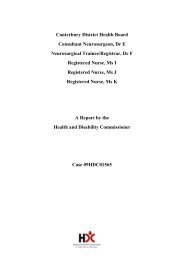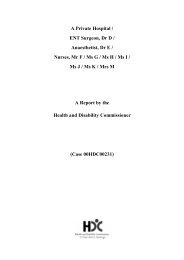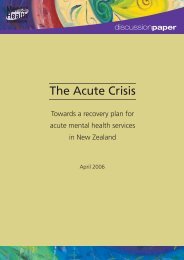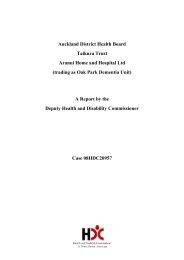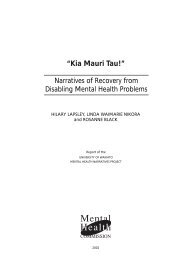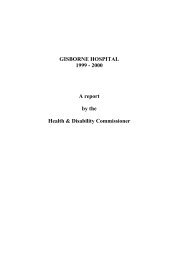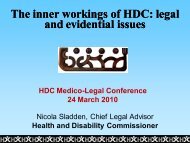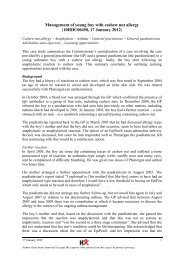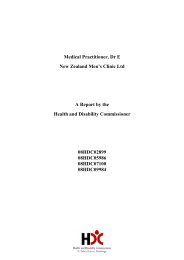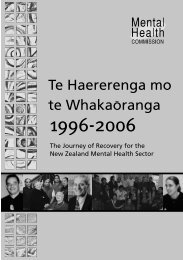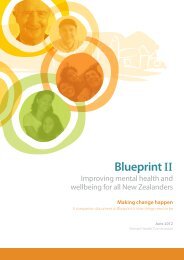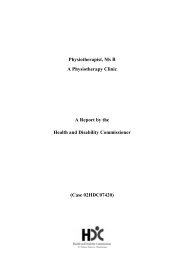Code of Ethics for the New Zealand Medical Profession - Health and ...
Code of Ethics for the New Zealand Medical Profession - Health and ...
Code of Ethics for the New Zealand Medical Profession - Health and ...
You also want an ePaper? Increase the reach of your titles
YUMPU automatically turns print PDFs into web optimized ePapers that Google loves.
Where no valid advance directive applies, <strong>and</strong> no one who is legally entitled to consent on <strong>the</strong><br />
consumer's behalf is available, services may only be provided to a consumer who is not<br />
<strong>the</strong>mselves competent to consent where <strong>the</strong> proposed services are in <strong>the</strong> best interests <strong>of</strong> <strong>the</strong><br />
consumer, <strong>and</strong> where <strong>the</strong> o<strong>the</strong>r provisions <strong>of</strong> Right 7(4) <strong>of</strong> <strong>the</strong> <strong>Code</strong> are met.<br />
To ensure consistency between <strong>the</strong> ethical <strong>and</strong> legal st<strong>and</strong>ards, <strong>and</strong> to avoid confusion<br />
amongst <strong>the</strong> pr<strong>of</strong>ession, we suggest that Recommendation 26 be amended to provide as<br />
follows: “When patients are not capable <strong>of</strong> making an in<strong>for</strong>med choice or giving in<strong>for</strong>med<br />
consent, <strong>and</strong> no valid advance directive applies, doctors can obtain consent to services from a<br />
person who is legally entitled to consent on that patient’s behalf. If a person legally entitled to<br />
consent on <strong>the</strong> patient’s behalf is not available, doctors should only provide <strong>the</strong> services if <strong>the</strong><br />
services are in <strong>the</strong> best interests <strong>of</strong> <strong>the</strong> patient, <strong>and</strong> should consider any previously expressed<br />
preferences from <strong>the</strong> patient …”<br />
Recommendation 41 – declaring interests<br />
As currently worded, this recommendation is ambiguous about to whom <strong>the</strong> declaration <strong>of</strong><br />
interest should be made. We suggest that <strong>the</strong> recommendation is amended to clarify that<br />
doctors should declare financial or o<strong>the</strong>r interests in commercial organisations or products to<br />
any potentially affected patients.<br />
Recommendation 46 – social media<br />
This newly proposed recommendation provides that doctors should exercise caution when<br />
using social media in a pr<strong>of</strong>essional or private capacity. We consider it appropriate to update<br />
<strong>the</strong> <strong>Code</strong> <strong>of</strong> <strong>Ethics</strong> to include a recommendation regarding social media, <strong>and</strong> note that <strong>the</strong><br />
<strong>Medical</strong> Council <strong>of</strong> <strong>New</strong> <strong>Zeal<strong>and</strong></strong> is also looking at <strong>the</strong>se issues. We note that<br />
Recommendation 46 does not refer directly to doctors accessing patients’ social media but<br />
suggest this is something you may wish to include.<br />
The Commissioner recently advised <strong>the</strong> <strong>Medical</strong> Council that, while he considers that<br />
accessing a patient’s social media in a pr<strong>of</strong>essional capacity may be acceptable in certain<br />
limited circumstances, it should only be accessed once patient consent has been obtained. The<br />
Commissioner does not consider it ethically or pr<strong>of</strong>essionally appropriate (except in<br />
emergency situations) <strong>for</strong> a doctor to access a patient’s social media <strong>for</strong> pr<strong>of</strong>essional purposes<br />
without that patient’s consent. We <strong>the</strong>re<strong>for</strong>e suggest that <strong>the</strong> newly proposed recommendation<br />
be amended to include <strong>the</strong> requirement <strong>for</strong> consent when accessing a patient’s social media.<br />
The doctor-patient relationship is underpinned by <strong>the</strong> principles <strong>of</strong> transparency,<br />
confidentiality <strong>and</strong> trust. Social media does not change those principles; ra<strong>the</strong>r, it raises new<br />
questions about what is ethical <strong>and</strong> pr<strong>of</strong>essional conduct in an era where digital connectivity<br />
is pushing <strong>the</strong> traditional parameters <strong>of</strong> pr<strong>of</strong>essional boundaries <strong>and</strong> patient confidentiality. 1<br />
Obtaining patient consent to access such in<strong>for</strong>mation may prevent harm to <strong>the</strong> <strong>the</strong>rapeutic<br />
relationship from accessing such in<strong>for</strong>mation, regardless <strong>of</strong> <strong>the</strong> in<strong>for</strong>mation being published<br />
in a public <strong>for</strong>um.<br />
1 For example, <strong>the</strong> majority <strong>of</strong> guidelines <strong>and</strong> st<strong>and</strong>ards published by overseas regulatory authorities <strong>and</strong><br />
medical colleges discuss <strong>the</strong> use <strong>of</strong> social media in <strong>the</strong> context <strong>of</strong> maintaining pr<strong>of</strong>essional boundaries (eg<br />
accepting a Facebook “Friend Request” from a patient) <strong>and</strong> patient confidentiality (eg publishing health<br />
in<strong>for</strong>mation about a patient on Facebook or an internet blog) see: British <strong>Medical</strong> Association Using social<br />
media: practical <strong>and</strong> ethical guidance <strong>for</strong> doctors <strong>and</strong> medical students; College <strong>of</strong> Physicians <strong>and</strong> Surgeons <strong>of</strong><br />
British Columbia Pr<strong>of</strong>essional St<strong>and</strong>ards <strong>and</strong> Guidelines: Social Media <strong>and</strong> Online Networking Forums<br />
(September 2010); General <strong>Medical</strong> Council Confidentiality (October 2009).



